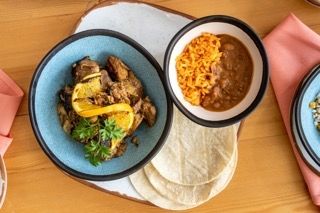Explore award-winning dishes served at best mexican westchester NY cantinas
Is Mexican Food Healthy And Balanced? Unboxing the Nutritional Perks of Conventional Components
The concern of whether Mexican food is healthy and balanced invites an expedition of its standard components. Beans and corn act as foundational staples, rich in protein and fiber. Avocados supply useful fats, while various natural herbs and spices add taste and health and wellness benefits - mexican food. With each other, these elements create a tapestry of nourishment. Nevertheless, the healthfulness of Mexican food usually relies on preparation techniques and part sizes. What role do these elements play in establishing its total dietary worth?
The Power of Beans: Healthy Protein and Fiber-Rich Staples
Frequently overlooked, beans serve as a keystone of Mexican cuisine, using a wide range of nutritional benefits. Rich in protein, they are an outstanding plant-based alternative for those looking for to satisfy their dietary protein needs. This high protein web content sustains muscle mass repair work and growth, making beans indispensable for both meat-eaters and vegetarians alike. Furthermore, beans are an exceptional source of dietary fiber, which aids in food digestion and promotes a feeling of fullness, potentially helping with weight monitoring.
The selection of beans used in Mexican dishes, such as black beans, pinto beans, and kidney beans, adds to a diverse taste account and can improve meals nutritionally. Additionally, beans are low in fat and consist of vital minerals and vitamins, including iron, magnesium, and folate. Together, these attributes make beans an essential active ingredient, supplying both sustenance and sustenance in conventional Mexican price.

Corn: a Versatile Grain With Nutritional Conveniences
Corn stands out as a versatile grain fundamental to Mexican cuisine, commemorated not just for its cooking applications yet additionally for its outstanding nutritional profile. As a key component in recipes like tortillas, tamales, and pozole, corn supplies crucial nutrients that add to a balanced diet regimen. Rich in carbohydrates, it acts as a significant energy source, while additionally being low in fat, making it a beneficial alternative for different dietary demands.
Additionally, corn is a good source of nutritional fiber, which aids in food digestion and advertises satiation. It consists of considerable amounts of vitamins such as B-complex vitamins, which are necessary for basal metabolism. The visibility of anti-oxidants, specifically carotenoids, adds to total wellness by lowering oxidative anxiety. In addition, corn is gluten-free, catering to those with gluten level of sensitivities. On the whole, the dietary benefits of corn highlight its relevance in traditional Mexican food and its duty in a healthy diet regimen.
Avocados: Healthy Fats and Nutrients in Every Bite
Avocados play a substantial duty in Mexican cuisine, enhancing meals with their luscious appearance and abundant flavor. Beyond their culinary charm, avocados are commemorated for their remarkable dietary account. They are a rich source of healthy monounsaturated fats, which can help reduced bad cholesterol levels and assistance heart wellness. In addition, avocados are packed with important vitamins and minerals, including potassium, vitamin E, and B vitamins, contributing to overall wellness.
The high fiber content in avocados aids digestion and promotes satiation, making them a valuable addition to any kind of meal. Their special nutrient structure can also sustain skin health and wellness and offer anti-inflammatory advantages. Incorporating avocados right into typical Mexican recipes or appreciating them as a standalone snack can improve both taste and nourishment, showing why they are a cherished staple in Mexican food. Generally, avocados offer a tasty means to enjoy healthy and balanced fats and essential nutrients in every bite.

Herbs and flavors: Flavorful Health Boosters
While delighting in the rich tastes of Mexican food, one can not overlook the essential function space 220 that spices and natural herbs play in boosting both taste and health. Components such as oregano, cilantro, and chili peppers not just add to the vibrant flavor account however additionally supply substantial health benefits. As an example, cilantro is recognized for its purifying properties, assisting to eliminate hefty metals from the body, while oregano is packed with anti-oxidants and has anti-inflammatory results.
Chili peppers, a staple in many Mexican dishes, have capsaicin, which has been connected to boosted metabolic process and discomfort alleviation. Furthermore, seasonings like cumin and coriander support digestion and might aid in blood glucose regulation. Including these savory health boosters right into dishes not just boosts the culinary experience yet also advertises total wellness, making Mexican cuisine not simply delicious, yet also nutritionally advantageous.
Traditional Food Preparation Approaches: Enhancing Nutrition and Taste
Conventional food preparation methods in Mexican food play a crucial duty in improving both nutrition and taste, as Source they frequently prioritize fresh ingredients and classic methods. Methods such as nixtamalization, where corn is soaked and cooked in an alkaline option, not only improve the nutrient account of tortillas however also improve their digestibility - hand crafted margarita. Additionally, making use of slow-moving cooking approaches, like cooking or braising, enables tastes to meld perfectly while maintaining the honesty of the ingredients

Often Asked Concerns
Are Mexican Food Portions Normally Larger Than Other Cuisines?
Mexican food parts are usually bigger than those of numerous other foods. This characteristic mirrors conventional eating techniques, highlighting common sharing and hearty dishes, which can cause a more considerable offering dimension overall.
How Does the Prep Work Method Affect Healthfulness of Mexican Food?
Preparation techniques substantially affect the healthfulness of Mexican food. Strategies such as grilling or steaming preserve nutrients, while frying can raise harmful fat content. Options of ingredients and Visit This Link cooking designs inevitably establish general nutritional value.
Can Mexican Food Be Tailored for Details Nutritional Limitations?
Mexican food can without a doubt be customized for details dietary limitations. Replacements, such as utilizing corn tortillas for gluten-free diet regimens or incorporating even more vegetables, enable people to appreciate standard tastes while suiting different nutritional demands.
What Are Usual False Impressions Concerning Mexican Food and Health?
Common mistaken beliefs about Mexican food consist of the belief that it is inherently undesirable, excessively spicy, and solely focused on fats. In truth, conventional recipes typically feature nutritious ingredients and can be customized to different dietary needs.
Are There Much Healthier Options at Mexican Restaurants?
Healthier choices at Mexican restaurants commonly consist of barbequed meats, beans, and fresh veggies. Choosing dishes that emphasize entire ingredients and staying clear of heavy sauces can cause a more nutritious eating experience, advertising general well-being.
The selection of beans made use of in Mexican recipes, such as black beans, pinto beans, and kidney beans, contributes to a varied flavor account and can improve meals nutritionally. Avocados play a significant function in Mexican food, enhancing dishes with their creamy texture and abundant flavor. Incorporating avocados into standard Mexican meals or appreciating them as a standalone snack can improve both flavor and nourishment, demonstrating why they are a precious staple in Mexican food. While enjoying the rich tastes of Mexican cuisine, one can not overlook the necessary role that spices and natural herbs play in enhancing both taste and health. Typical food preparation techniques in Mexican food play a vital duty in improving both nutrition and taste, as they commonly prioritize time-honored methods and fresh components.